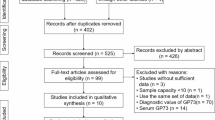Abstract
To investigate the relationship of tumor associated glycoprotein-72 (TAG-72) expression with clinicopathological features in hepatocellular carcinoma (HCC) patients. Sixty pairs of HCC and paracarcinomatous (PCLT) tissues, and 10 nomral liver (NL) tissues were collected for Western blot analysis, and 244 pairs of HCC and PCLT tissues were collected for immunohistochemistry analysis. TAG-72 protein expression was elevated significantly in HCC tissues compared with PCLT and NL tissues. Its increased expression was correlated with TNM stage, Edmondson-Steiner grade, vein invasion and multiple tumor nodes. It is noteworthy that the HCC patients with high TAG-72 expression had shorter overall survival and disease-free survival than the patients with low expression. Multivariate Cox regression analysis revealed that TAG-72 expression was an independent prognostic factor for HCC patients. The current study demonstrated for the first time that the increased expression of TAG-72 was correlated with poor survival in patients with HCC, indicating that TAG-72 is a novel prognostic marker for HCC.



Similar content being viewed by others
References
Zhang MF, Zhang ZY, Fu J, Yang YF, Yun JP (2009) Correlation between expression of p53, p21/WAF1, and MDM2 proteins and their prognostic significance in primary hepatocellular carcinoma. J Transl Med 7:110
Teo EK, Fock KM (2001) Hepatocellular carcinoma: an Asian perspective. Dig Dis 19:263–268
Leoni S, Piscaglia F, Righini R, Bolondi L (2006) Management of small hepatocellular carcinoma. Acta Gastroenterol Belg 69:230–235
Jin B, Wang X, Jin Y et al (2009) Detection of serum gastric cancer-associated MG7-Ag from gastric cancer patients using a sensitive and convenient ELISA method. Cancer Invest 27:227–233
Molina R, Auge JM, Escudero JM et al (2008) Mucins CA 125, CA 19.9, CA 15.3 and TAG-72.3 as tumor markers in patients with lung cancer: comparison with CYFRA 21–1, CEA, SCC and NSE. Tumour Biol 29:371–380
Chen L, Wang Y, Liu X et al (2008) A new TAG-72 cancer marker peptide identified by phage display. Cancer Lett 272:122–132
Kim SJ, Hong HJ (2007) Guided selection of human antibody light chains against TAG-72 using a phage display chain shuffling approach. J Microbiol 45:572–577
Chauhan SC, Vinayek N, Maher DM et al (2007) Combined staining of TAG-72, MUC1, and CA125 improves labeling sensitivity in ovarian cancer: antigens for multi-targeted antibody-guided therapy. J Histochem Cytochem 55:867–875
Mohsin H, Jia F, Sivaguru G, Hudson MJ et al (2006) Radiolanthanide-labeled monoclonal antibody CC49 for radioimmunotherapy of cancer: biological comparison of DOTA conjugates and 149Pm, 166Ho, and 177Lu. Bioconjug Chem 17:485–492
Santos-Juanes J, Bernaldo de Quirós JF, Galache Osuna C et al (2004) Apocrine carcinoma, adenopathies, and raised TAG-72 serum tumor marker. Dermatol Surg 30:566–569
Milenic DE, Brady ED, Garmestani K, Albert PS, Abdulla A, Brechbiel MW (2010) Improved efficacy of alpha-particle-targeted radiation therapy: dual targeting of human epidermal growth factor receptor-2 and tumor-associated glycoprotein 72. Cancer 116:1059–1066
Zou P, Xu S, Povoski SP et al (2009) Near-infrared fluorescence labeled anti-TAG-72 monoclonal antibodies for tumor imaging in colorectal cancer xenograft mice. Mol Pharm 6:428–440
Oei AL, Sweep FC, Thomas CM, Boerman OC, Massuger LF (2008) The use of monoclonal antibodies for the treatment of epithelial ovarian cancer. Int J Oncol 32:1145–1157
Ponnusamy MP, Venkatraman G, Singh AP et al (2007) Expression of TAG-72 in ovarian cancer and its correlation with tumor stage and patient prognosis. Cancer Lett 251:247–257
Ouyang M, Wu W, Zou Y, Zhou J, Wang Z, Wan X (2010) Immunoreactivity and prognostic value of tumor-associated glycoprotein 72 in primary gallbladder carcinoma. Surg Oncol 19:82–87
Graves SS, Dearstyne E, Lin Y et al (2003) Combination therapy with Pretarget CC49 radioimmunotherapy and gemcitabine prolongs tumor doubling time in a murine xenograft model of colon cancer more effectively than either monotherapy. Clin Cancer Res 9:3712–3721
Acknowledgments
This work was supported by the freedom explore Program (2011QNZT206) of Central South University.
Author information
Authors and Affiliations
Corresponding author
Rights and permissions
About this article
Cite this article
Zhang, Y., Deng, Zs., Liao, Mm. et al. Tumor Associated Glycoprotein-72 is a Novel Marker for Poor Survival in Hepatocellular Carcinoma. Pathol. Oncol. Res. 18, 911–916 (2012). https://doi.org/10.1007/s12253-012-9521-0
Received:
Accepted:
Published:
Issue Date:
DOI: https://doi.org/10.1007/s12253-012-9521-0




